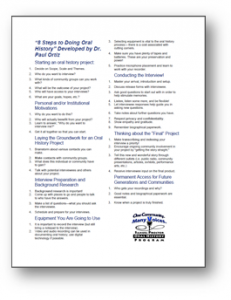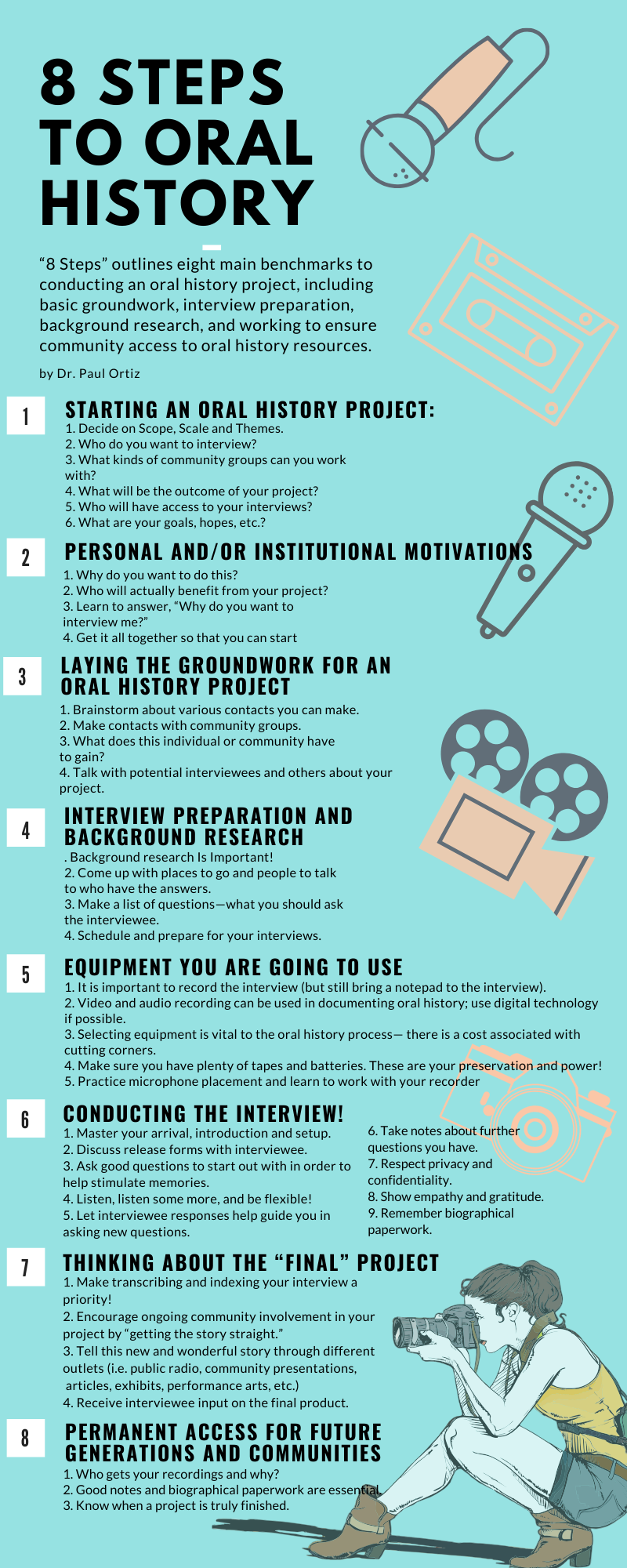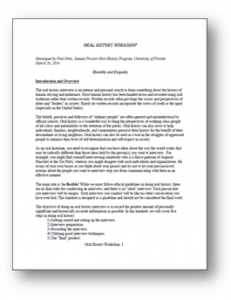The Samuel Proctor Oral History Program offers workshops in oral history practice, methodology and fieldwork for community groups, academic institutions, and other organizations interested in beginning oral history projects.
Introduction to Oral History from Dr. Paul Ortiz
Dr. Paul Ortiz, director of the Samuel Proctor Oral History Program, prepared the following outlines to conducting successful oral history projects: “8 Steps,” an oral history project handout, and “Oral History Workshop,” which provides an overview of interviewing skills and practice, focusing on humility and empathy.
8 Steps
 “8 Steps” outlines eight main benchmarks to conducting an oral history project, including basic groundwork, interview preparation, background research, and working to ensure community access to oral history resources.
“8 Steps” outlines eight main benchmarks to conducting an oral history project, including basic groundwork, interview preparation, background research, and working to ensure community access to oral history resources.
- Starting on an oral history project: deciding on scope, scale, and themes
- Personal and/or institutional motivations
- Laying the groundwork
- Interview preparation and background research
- Equipment
- Conducting the interview
- Thinking about the “final” project
- Permanent access for future generations and communities
8 Steps to Doing Oral History (PDF). (opens in new tab)

Oral History Workshop
 “Oral History Workshop,” a guide to interviewing skills and oral history collection newly revised for 2014, reviews skills and best practices to record the greatest amount of personally significant and historically accurate information as possible.
“Oral History Workshop,” a guide to interviewing skills and oral history collection newly revised for 2014, reviews skills and best practices to record the greatest amount of personally significant and historically accurate information as possible.
The success of the interview depends to a great degree on the amount of trust and understanding the interviewer is able to create with the narrator. Courtesy and empathy are a part of this process.
-Dr. Paul Ortiz
Oral History Workshop (PDF) (opens in new tab)
Legalities and Ethics of Oral History
Information about the legalities and ethics of oral history practice is available for download from the Oral History Associ (opens in new tab)ation (opens in new tab). Read the information carefully before you begin your project to avoid the legal dilemmas.
- The Oral History Association’s Pamphlet Series (opens in new tab) is available online for download.
The consent of the interview respondent is a crucial component of ethical oral history practice. Consent for using the interview’s contents is typically transferred through a creative common license. Click here to access the Samuel Proctor Oral History Program’s creative common license document.
Oral History and Digital Humanities
Technology How-To’s and Tutorials from Deborah Hendrix
Deborah Hendrix, SPOHP’s Digital Humanities Advisor, structured introductory how-to videos and demonstrations for interested researchers preparing to use different computer programs and technologies related to oral history collection. Additional tutorials are available on SPOHP’s YouTube channel, SPOHP111 (opens in new tab).
Transcription and Abstract Production
Transcription is a central component of processing interviews. Transcription creates a written testimony from interviews. That testimony makes individuals’ powerful personal experiences accessible to the public as educational tools. To learn more about transcription click here (opens in new tab).
Additional Resources
There are many outstanding examples of books, web sites, musical compositions that use oral history to extend knowledge of the human condition. Examples of books and other sources that contain clues on how to use oral history as a tool of remembrance, equity and social justice include:
- Stetson Kennedy, Palmetto Country (1942). (opens in new tab)
- Stetson Kennedy, The Florida Slave. (opens in new tab)
- Voices of Witness: Illuminating Human Rights Through Oral History. (opens in new tab)
- Groundswell: Oral History for Social Change. (opens in new tab)
- Bracero History Archive. (opens in new tab)
- Learn more about SPOHP’s community partners. (opens in new tab)
The Oral History Association
The Oral History Association (opens in new tab) seeks to bring together all persons interested in oral history as a way of collecting and interpreting human memories to foster knowledge and human dignity. With an international membership, the OHA serves a broad and diverse audience. Local historians, librarians and archivists, students, journalists, teachers, and academic scholars from many fields have found that the OHA provides both professional guidance and a collegial environment for sharing research. To guide and advise those concerned with oral documentation, the OHA has established a set of goals, guidelines, and evaluation standards for oral history interviews.
-
-
- See Principles and Best Practices (opens in new tab) from the Oral History Association.
- For information regarding release forms, copyrights, and access, available, see the OHA’s official Pamphlet Series (opens in new tab).
- The OHA also recognizes outstanding achievement in oral history through an Awards Program (opens in new tab). Awards are given in the categories of oral history publications, nonprint media productions, teaching , and projects.
- Join the Oral History Association (opens in new tab) today!
-
For additional information, contact SPOHP, call the offices at (352) 392-7168, and connect with us online today.
